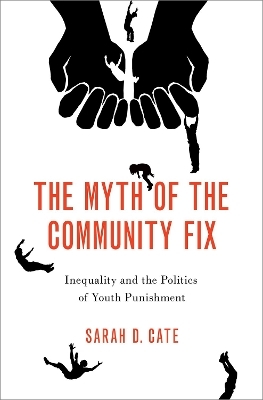
The Myth of the Community Fix
Oxford University Press Inc (Verlag)
978-0-19-767429-1 (ISBN)
As the extent of America's mass incarceration crisis has come into sharper view, politicians, activists and non-profit foundations from across the political spectrum have united around "community-based" reforms. Many states are pursuing criminal justice reforms that aim to move youth out of state-run prisons and into community-based alternatives as a way of improving the lives of youth caught in the juvenile justice system.
In The Myth of the Community Fix, Sarah D. Cate demonstrates that rather than a panacea, community-based juvenile justice reforms have resulted in a dangerous constellation of privatized institutions with little oversight. Focusing on case studies of three leading states for this model of reform--Texas, California, and Pennsylvania--Cate provides a comprehensive look at the alarming on-the-ground consequences of the turn towards community in an era of austerity. Although often portrayed as a break with past practices, this book documents how community-based reforms are the latest in a long line of policy prescriptions that further individualize the problem of delinquency, bolster punitiveness, and reduce democratic accountability. Through contextualizing the community-based reform movement as part of the broader shift away from the centralized provision of public goods in the United States, Cate shows why those committed to addressing the problems of mass incarceration should be wary of the community fix.
Sarah D. Cate is Assistant Professor of Political Science at Seattle University. She received bachelor's degree in political science and English from the University of Oregon and a master's degree in political science from the University of Oregon. She earned a PhD in political science from the University of Pennsylvania. Her research focuses on mass incarceration, criminal justice reforms, and political economy.
Introduction: The Limits of the Community-Based Reform Movement: Evidence from Pennsylvania, California and Texas
Chapter 1: Abandoning Public Goods: The Turn to Community in the Context of Inequality
Chapter 2: Devolution, Not Decarceration: Expanding Punishment Closer to Home
Chapter 3: Privatizing Punishment: Consequences of Foundation-Led Policymaking
Chapter 4: The Individual Focus: The Limits of Behavioral Solutions to Structural Problems
Chapter 5: Still Punitive: Rationalizing Punishment for the 'Worst of the Worst'
Conclusion: Bringing Public Goods Back In
References
Index
| Erscheinungsdatum | 15.02.2023 |
|---|---|
| Zusatzinfo | 17 graphs; 5 tables |
| Verlagsort | New York |
| Sprache | englisch |
| Maße | 236 x 155 mm |
| Gewicht | 404 g |
| Themenwelt | Recht / Steuern ► Allgemeines / Lexika |
| Recht / Steuern ► EU / Internationales Recht | |
| Sozialwissenschaften ► Politik / Verwaltung ► Politische Theorie | |
| Sozialwissenschaften ► Politik / Verwaltung ► Vergleichende Politikwissenschaften | |
| ISBN-10 | 0-19-767429-1 / 0197674291 |
| ISBN-13 | 978-0-19-767429-1 / 9780197674291 |
| Zustand | Neuware |
| Informationen gemäß Produktsicherheitsverordnung (GPSR) | |
| Haben Sie eine Frage zum Produkt? |
aus dem Bereich


